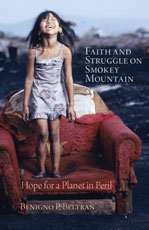"I spent a lot of time meditating before the flames of the burning garbage. When I stared long and hard into the fire, I stood mesmerized. There was something mystical, hypnotic, and atavistic about it. I often saw figures of dragons, dinosaurs, troglodytes, and other kinds of monsters whenever I peered long enough into the flames. Most times, the whoosh of the burning garbage, punctuated by the explosion of aerosol cans, reminded me of the primordial fire that engulfed the entire cosmos a few nanoseconds after the Big Bang. In that primeval explosion 13.7 billion years ago came all the elements of the stuff we are made of, along with everything that ends up in the garbage dump.
"Observing the garbage from multiple levels of meaning, I picked up a piece of plastic. Behind it, I imagined the factory and the workers that produced it, the chemicals and the refinery, the oil wells and the drilling machines, the bacteria by the trillions and the organic material that decomposed, the formation of planet earth and the stars that died in order to produce the different elements in it. Behind every piece of plastic in the garbage dump is the whole universe. In the suffocating heat of the crackling inferno, the deathly smell, the continuous din of garbage trucks vomiting their load, I was reminded that Smokey Mountain was a metaphor for a world gone terribly wrong.
"The scavengers have a special term for the smoke coming from the burning trash. They call it asap. It has particulates that irritate the eyes and cause labored breathing, often suffocation in infants and very small children. It also causes acute and chronic asthma, bronchitis, emphysema, and constriction of the bronchi and tissue damage of the lungs. The particulates are also very potent carcinogens. Studies have shown that some two hundred human diseases, ranging from cerebral palsy to testicular atrophy, are linked to pollutants like these. It was estimated at the 1992 United Nations Conference on Environment and Development that more than four million children die from waste-related illnesses each year."
